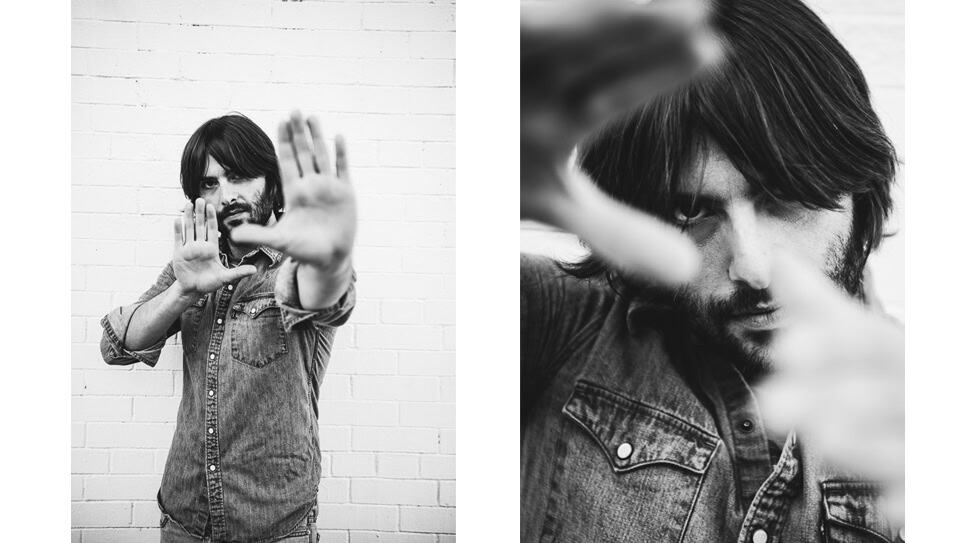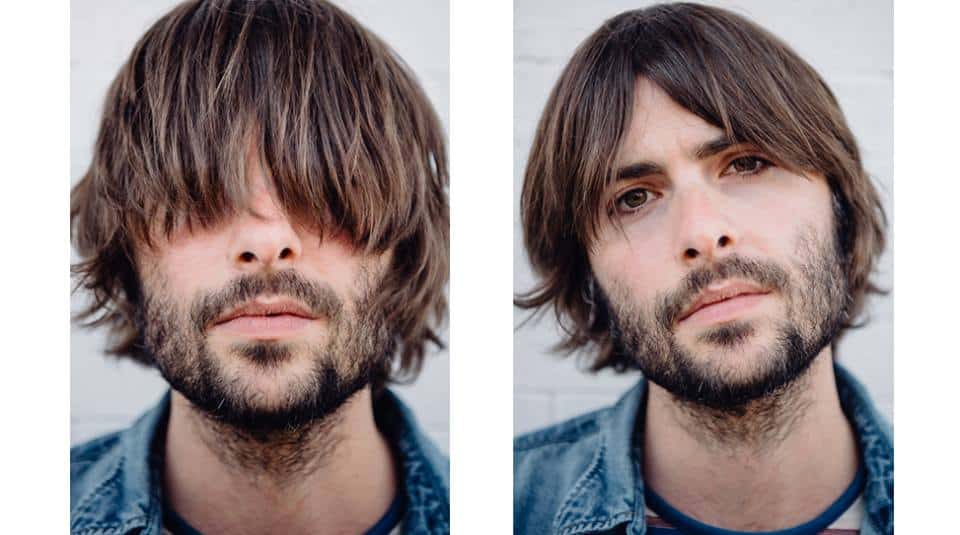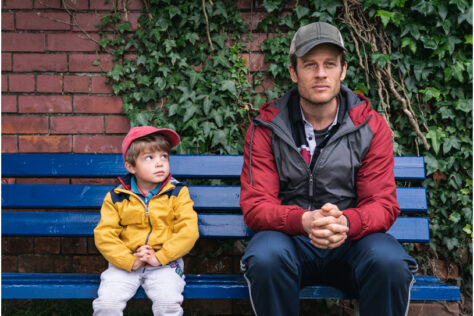I ended up getting swept up into the music industry with Rooney and that was very unexpected for me. I wasn’t trying to pursue that.
Heretofore better known as the frontman of sh-sh-shakin’ rockers Rooney, a Coppola scion—i.e. Sofia and Roman’s cousin—and Jason Schwartzman’s younger brother, Robert Schwartzman furthers the family legacy with his debut feature, Dreamland, a music-centric coming-of-age tale.
The film takes familiar cues from the 1967 classic The Graduate—the awkward humor, the aimless protagonist, and the forbidden love affair—and knowingly so. Johnny Simmons plays Monty, a down-and-out piano-playing underdog who dreams about one day opening his own piano bar in Los Angeles. Barely staying afloat playing a temp gig at a luxury hotel bar, he’s nudged out of stagnant deadness by Olivia (Amy Landecker), an older patron and his soon-to-be benefactress. All lipstick, libidinous, and with no-object money to throw at the young man in exchange for sex, Monty willingly becomes Olivia’s hard-up gigolo. Much like the young Dustin Hoffman, he develops real feelings and hatches fantasies about running away with the married woman to avoid life’s rougher patches. Not unlike Mrs. Robinson before her, Olivia’s only in it for the thrill.
Anthem met up with Schwartzman in Manhattan for an extended photoshoot and later played catch-up via phone to discuss his new movie, the future of Rooney, and what he was like as a kid.
Dreamland is now playing in select theaters and available to view On Demand.
How are you doing today, Robbie?
I’m good! All is well, yeah. Thank you.
How did the shoot go with our photographer? Sorry I couldn’t be there with you guys.
As long as he’s happy… I don’t know what he got, but he seemed to feel good about it.
So when did this journey begin with Dreamland?
It started in 2012. It was with my friend Kyle, whose writing name is Benjamin Font. He had written different plays and he’s a screenwriter. I thought it’d be really cool to collaborate with him because I really liked his writing. I pitched him this idea of Monty, a piano player, and his journey and a relationship that has long-expired and him getting swept up in this love affair with a married woman. It’s an L.A. kind of story. Kyle liked the idea so we started writing the screenplay. You never know what will happen with this kind of stuff, like, you just go with it. You hope that it will become more real as you have something. You just have to believe that it’s going to happen.
What were some of the earlier challenges?
It took time to figure out how to make this movie in Los Angeles on a smaller budget. We made it as a micro-budget, but it has more locations and actors than you’d like to have on a micro-budget. So part of it was trying to figure out how to assemble it, brick by brick. You go through the process of trying to find believers. We found ourselves with a shooting date on the horizon and you’re trying to make it more real for people. Eventually, I met Mel [Eslyn] who brought her sort of Duplass-style micro-budgeting to the equation where investors can take a little bit less of a gamble on you. It all starts with having a cast and crew that take it seriously. Once we cast Johnny [Simmons], we were able to build around him and people suddenly had an idea about who Monty is. That also gave me certain material to help show people what my vision was for this story. You do the best you can to try and paint a picture for people early on in the process.
How closely do you relate to Monty as a character?
Although I’m a musician, the type of music he plays is different than the sort of music I play. He’s a piano teacher who has this job playing lounge music, which is a different style of musician. But what I can relate to is the feeling of wanting people to take you seriously. When you have something you want to achieve, you just have to keep fighting and proving yourself. I think a lot of people are faced with that at different times in their lives. Also, the sexual connection, the physical side of a relationship, is really important. Sometimes, when you lose that, you start to feel kind of alone and more vulnerable. Monty is a character who feels very temporary in every which way he looks. People don’t take him seriously anymore—the people closest to him. There’s a purpose that’s missing. There’s a missing ingredient in a lot of these characters. When you no longer have a cheerleader in your life, you can sometimes second-guess yourself and lose confidence. He’s so vulnerable to Amy’s [Landecker] character because she’s rooting for him. She makes him believe in himself and that’s why he falls for her so quickly. There’s a sense of dreaming or not reaching your dreams or not getting an alternative to your dreams. That’s explored in this movie.
There’s a line about music in the movie that’s meant to sum up life: “It’s all about choices: What notes you play, how you play it, when you play it, and what notes you’re after.” Robbie, you’re passionate about music, obviously, but you’re elastic enough to try out other things.
I really appreciate that. It’s fun to experiment, play around, and get your hands dirty. I really like that feeling. No matter what it is, it’s interesting to take on new projects and try to figure out what you do with them. As a kid, I was always taking things apart. I wanted to see how it all pieced together. It’s the same with filmmaking or album-making or making anything: You rip it all apart and put it back together. Every time you do that, you have a new perspective on it.
What were you like as a kid?
I was pretty shy. I would just go off and do things on my own. For example, I ended up getting swept up into the music industry with Rooney and that was very unexpected for me. I wasn’t trying to pursue that. I wasn’t trying to form a band and go on tour. I was always very shy, so the idea of being on stage and singing was a scary feeling for me. But, at a certain point, I started to really love it. I also look up to my brothers a lot. I’m the youngest in my family, so I really look up to them and we’ve always shared music and movies. I got to be a sort of fly on the wall for a lot of my life with people who were in different industries. I really like to ask questions and learn through experience. That’s something that, as a kid, I always really enjoyed. With making a movie, you just let the excitement pull you there and, once you’re there, figure out what you’re going to do. That’s part of the fun of it. The part of the journey is not knowing and then figuring it out.
Is it true that Monty was inspired by a pianist you saw play at the Bel-Air Hotel?
Yeah. They actually remodeled it and it has since lost its charm. But the Bel-Air is a very classic hotel in L.A. with a lot of history. I’ve been there a few times to watch this piano player. It’s interesting because, sometimes, people aren’t paying attention to the piano player in a lounge. Making music is a pretty amazing experience. It’s a pretty incredible thing to be able to play an instrument on that level. I really admire musicians. It’s just interesting to watch someone who gets higher, to a place where no one is noticing them. I wonder: Does this person feel alone and disconnected? What’s their connection to music and performance when they’re sort of background music? I wanted to learn, like, what is this person’s history? Who is this person playing the piano who’s been here forever? It’s a “Fred Russo” guy. If I went to a bar and I saw a “Fred Russo” there, I would want to know what his journey was. That was the inspiration. Monty is kind of an old soul, you know what I mean? He’s cut from a different cloth. There’s an innocence to him as well.
Well, he already looks like a baby. He has that baby face to begin with. I feel like casting is such an intimate process for filmmakers. How did you come to find Johnny for this?
I was familiar with him, but what really won me over was the way he spoke behind-the-scenes on different films. When someone’s just talking and not acting, you get a different feeling from them. By the way, I think people are always putting on a show on some level once they’re on camera. There was a sweetness to Johnny that wasn’t forced. I felt like this character gets himself mixed up in different situations and Johnny might be able to find a way out of them. I think for the audience to really buy into Dreamland, it all starts with buying into Monty. He’s the entry into this film, so finding an actor who can say a lot in very subtle ways was going to be important. We just wanted to find a way for you to feel like you’re inside of this guy’s head right now. What’s interesting about this movie that’s unlike other stories is that Monty doesn’t have any friends to sort of confide in. It’s not like he has a best friend at the hotel to say, “Hey man, you’re never gonna believe it, but I went home with this girl last night. We had a crazy time and I can’t wait to see her again.” He has nobody to share that inner voice with, right? We just have to find it with him. That’s sort of the beauty of, I think, Johnny’s performance and the feeling that comes across.
The music has an expectedly big presence in the film. “Sad But True” is wonderful. I love the work you did on Palo Alto, too, by the way. When did the music come into the picture?
Really early on. I wrote “Sad But True” before we shot the movie to work on the concept and the feeling. When we cut the movie, we already had a lot of music to work with that I’d been writing and recording. It was cool to work with original music throughout the edit, which I think was different for our editor Chris [Donlon], too. I think he liked working with music that we had already imagined for the film. I had also pulled a lot of music from bands or other artists that I really liked that I felt tonally complimented the story we were trying to tell. Then I’d go back and write to sort of fill in the blanks. It was a balancing act. There were so many different styles of music that we tried throughout the edit. Then we started to pull out to really hone in on the feeling of the overall movie. The trick was figuring how to create the feeling of the music around the characters and the music within the story. Monty’s a piano player so he’s playing music in the movie that the other characters are hearing, but we’re also trying to tell a story about that music.
Diegetic versus non-diegetic. I went to film school. They also told us never to use those terms outside of school because you will get side eye and, like, get chased out of sound stages.
[Laughs] Yeah, so there’s a duality between the score and the music on camera. So the question is, how does the piano-playing fit with the other palate of music, which is the score? I think the music does create a real identity for this movie. Some of my favorite music is from films, so I’m always excited whenever people say that they really connected to the theme music in the movie.
There’s a heartbreaking scene in the film where Monty is on the phone with his mom, who’s obviously played by your real mom, Talia Shire. Is that scene as personal to you as it seems?
It’s very personal. Everyone has their own relationship to their parents. Whenever my mom would say something to me, I really felt like she would hit the nail on the head sometimes. Most of the time, she was always right when she would give me her opinion on something. You might push it away and, as hard as it is to hear it, that voice can sometimes resonate with you, if at the right time.
My mom once told me, “Don’t be a loser,” when I needed to hear it. I still remember it.
[Laughs] I think Monty’s kind of avoiding his mother throughout the movie but, eventually, he picks up that phone call and it’s at a time when he needs to hear it. That’s sort of an awakening for him as a character. She represents truth in his life, you know? She represents that inner-voice he has that he knows is true. She says it so clearly to him. The conversation isn’t this crazy, heavy emotional exchange. It’s a very simple exchange that’s, in its simplicity, the most heavy.
What are you setting off to work on after Dreamland?
There were moments where I thought I would go off and do something else once we were in post with Dreamland, but it’s interesting because the process just keeps going, you know what I mean? It’s hard to walk away from a movie because it just keeps pulling you back in. I feel like I’m still all over Dreamland right now. Now that we’re finally putting it out, I still want to continue this process of sharing it with people. But yeah—I’m excited! I’m thinking about new ideas and things that I’d like to do next year and, hopefully, I can begin something new.
Rooney was on hiatus and now you guys are back, too. In terms of your evolution as an artist and the very core of your creativity, where do you think you’re going?
I really just want to stay consistent with work, I guess. Rooney has been tough just due to the nature of the beast. I think the music industry has been going through a lot of transitions, which has changed the way musicians interact with music and the fans. It’s just a different time in the industry. I keep trying to figure out how to do it kind of on my own and independently. So that’s a separate kind of puzzle. I’ve been on labels, off labels—I’m just trying to figure out how to keep putting music out at a good pace. And, I like to tour. I also want to work on features. I would never complain about this because I just feel fortunate enough to be able to make these projects or try to work on them. It’s just a question of how to keep doing them. That’s the next thing to figure out.



 About a Boy: James Norton
About a Boy: James Norton Clarion Call: Garrett Hedlund
Clarion Call: Garrett Hedlund
No Comments